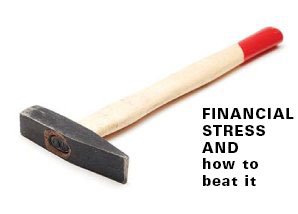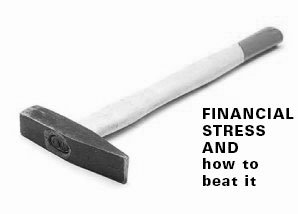BEEF UP YOUR FINANCIAL FITNESS
The word fitness is more often used to describe a physical state of health, rather than a financial one. However, it is equally applicable to both.
Athletes require vigorous training, discipline, and endurance to succeed in their sport of choice, and the same set of skills are required for us to manage our money effectively. So, what does it mean to be financially fit?
A general definition of financial fitness would refer to having the money you need when you need it1. A further definition would include having savings, not being in debt, and living within your means1. It’s important to do periodic checkups on the state of your financial health to ensure that everything is in place.
What shape are you in?2
Even if you look good on the outside, it doesn’t necessarily mean that you’re healthy on the inside. Some of your financial “muscles” may be overstretched, while others sit around bored and unused. The first step in every checkup is to look at one’s vital signs. Is your retirement fund doing well? Do you have enough for an emergency? How’s your credit? Secondly, check up on your day-to-day routine. It’s important to go over your daily spending while monitoring your overall budget. Thirdly, take a look at your borrowing habits. Do you have large debts like loans to worry about? Maybe you have a car that you have not paid off. After a thorough examination of your current financial state, you can then move on to improving your financial fitness.
Improve your shape3
Now that you are aware of your financial status, improving your finances becomes the next step. While beginning something new, it is always advisable to set a specific goal. If you go to the gym without a plan, you will probably jog on the treadmill for a bit before calling it a day. Similarly, you need to zero in on a goal, like “I will save 30% of my income this month.” Having like minded friends or family are also helpful whenever we begin a new journey. Your loved ones tend to hold you accountable, leading you to achieve your goals more frequently than if you were to go at it alone.
Eat a diverse diet4
The key to a lifetime of physical fitness is building a strong core. Hardy abdominal muscles help you to maintain your posture, mobility, and flexibility. Financially, your core is your long-term savings and these can be improved by choosing your investments wisely. Investing in the right mix of assets is always a good idea. Stocks and bonds are a good place to start, and younger investors are encouraged to take more risks. Research shows that being too conservative early on reduces the likely value of your portfolio at age 65 by 30%.
Count your calories
When starting a healthy diet, it’s important to keep track of everything that comes in. The financial equivalent of calorie counting takes the form of tracking your spending.
Whether it’s to save more or to pay off your debt, knowing where your money goes is a crucial first step. The details matter when doing this, so it’s important that you take note of all your spending (credit card, debit card, cash, etc.). There are a variety of apps that could help you do this, but if you prefer to do it manually, a simple spreadsheet will do. Regardless of which one you pick, start by listing your monthly bills like rent, loans, utility and phone bills, and the like. Next, move to your out of pocket spending for the week. This includes groceries, personal items, meals, and snacks. Review your list carefully and take note of where you can save or spend more efficiently in the future.5
Pump up your salary6
Breaking to the next level can be very difficult if you stick to the same fitness routine you’ve always done. Sometimes picking up a new sport of going for a new class is just what you need to push you further. The same goes for your career. Jumping to a new job will likely result in a salary that is 18-20% higher than what you would get via an internal promotion, according to a study by Wharton professor Matthew Bidwell6.
One of the best ways to do this is to reach out to your existing network. Ask your friends if there are openings at their companies, or message your LinkedIn contacts to see if they can help. If you love your job or you don’t find yourself in a position to move, that does not mean that you have to settle for a small increment. Simply asking for more goes a long way.
A study from Payscale found that 75% of employees who asked for an increase got one, with 44% getting the exact figure they requested7.
So, be bold! An even higher income could actually be within your reach.
Some of your financial “MUSCLES” may be overstretched, while others sit around bored and unused.
Your literal health is important too8
Taking care of your financial health is much easier when you are in good physical health as well. Research indicates that when a person is overweight, they tend to spend more per annum on medical expenses and sick leave, while a couple that retires in good health will spend 20% less on medical care than a couple in poor health will. With many clinics and hospitals offering free wellness screenings and holistic health information, there is really no reason not to participate in preventative healthcare. Technology has also made it easier to keep track of our fitness with a plethora of health apps that range from just tracking your steps to mapping out runs to watching your heart rate. Make exercising easier by loading one of these apps into your smartphone, or get a wearable fitness tracker to encourage more physical activity.
It’s all in your mind9
The road to financial fitness has as much to do with practical applications as it does with adjusting how you think about money. You don’t have to run a marathon to be considered “fit”. You can be considered fitter just by being able to run 1km more than you could before. Financial fitness is about putting yourself on the right path, not reaching a magical number on a net worth statement. Acknowledging your achievements constantly while continuing to set appropriate goals and objectives will provide the motivation you need to keep improving. An Olympian was not created in a day, but with dedication and perseverance, you can be the champion of your personal finances.
1 Wealthcontrol.com, “What Does It Mean To Be Financially Fit?”, July 27, 2014.
2 Time.com, “10 Days to Total Financial Fitness”, February 17, 2015.
3 Time.com, “4 Ways to Hit Your Money Goals”, February 18, 2015.
4 Time.com, “5 Ways to Invest Smarter at Any Age”, February 20, 2015.
5 Saveandinvest.org, “Track Your Spending”, September 5, 2015.
6 Time.com, “The 3 Best Ways to Boost Your Earnings This Year”, February 25, 2015.
7 Payscale.com, “3 Things You Don’t Know About Negotiating Salary”, January 24, 2015.
8 Time.com, “4 Health Moves That Can Make You Richer”, February 26, 2015.
9 Finance.youngmoney.com, “Financial Fitness”, undated.


 LIKE THIS ARTICLE?
LIKE THIS ARTICLE?





















